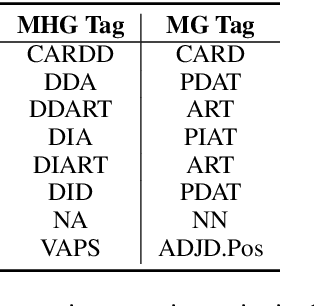Cross-Lingual Constituency Parsing for Middle High German: A Delexicalized Approach
Paper and Code
Aug 29, 2023



Constituency parsing plays a fundamental role in advancing natural language processing (NLP) tasks. However, training an automatic syntactic analysis system for ancient languages solely relying on annotated parse data is a formidable task due to the inherent challenges in building treebanks for such languages. It demands extensive linguistic expertise, leading to a scarcity of available resources. To overcome this hurdle, cross-lingual transfer techniques which require minimal or even no annotated data for low-resource target languages offer a promising solution. In this study, we focus on building a constituency parser for $\mathbf{M}$iddle $\mathbf{H}$igh $\mathbf{G}$erman ($\mathbf{MHG}$) under realistic conditions, where no annotated MHG treebank is available for training. In our approach, we leverage the linguistic continuity and structural similarity between MHG and $\mathbf{M}$odern $\mathbf{G}$erman ($\mathbf{MG}$), along with the abundance of MG treebank resources. Specifically, by employing the $\mathit{delexicalization}$ method, we train a constituency parser on MG parse datasets and perform cross-lingual transfer to MHG parsing. Our delexicalized constituency parser demonstrates remarkable performance on the MHG test set, achieving an F1-score of 67.3%. It outperforms the best zero-shot cross-lingual baseline by a margin of 28.6% points. These encouraging results underscore the practicality and potential for automatic syntactic analysis in other ancient languages that face similar challenges as MHG.
 Add to Chrome
Add to Chrome Add to Firefox
Add to Firefox Add to Edge
Add to Edge